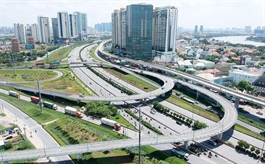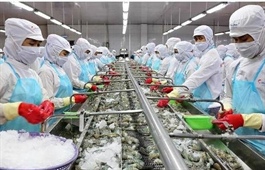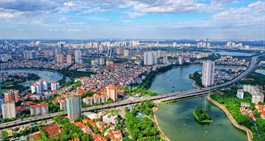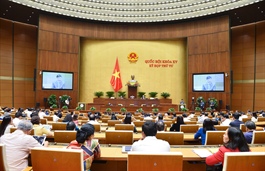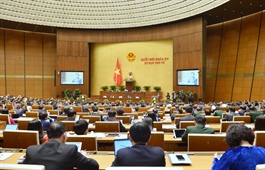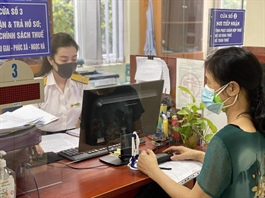Long-term outlook stable for foreign investment capital
Long-term outlook stable for foreign investment capital
The consecutive on-year reduction of newly registered capital since early this year may dampen the foreign-invested capital landscape for the whole 2022 compared to initial expectations, but a rise in disbursement is showing investors’ growing confidence in the economy for the long term.

The decline of newly registered capital in 2022 thus far was a topic of interest at the 15th National Assembly’s (NA) ongoing fourth session, when both reports from the government and the National Assembly Economic Committee showed concern about the situation.
The governmental report showed that in the first three quarters of 2022, total registered foreign-invested capital saw a downturn of 15.3 per cent on-year, while newly registered capital accounted for 57 per cent on-year. These contours show that Vietnam has yet to take full advantage of the shift of foreign capital inflow.
“The decline in such capital may impact on the expansion plans of foreign-invested enterprises already here, the current balance, foreign exchange reserves, the interest rate, and the ability to attract high-tech projects in both the mid-term and long-term,” the report noted.
Foreign investors like Lego see funding in places like Vietnam as a long-term strategy
Meanwhile, Vu Hong Thanh, Chairman of the National Assembly Economic Committee, said, “The reduction of registered capital volume may impact the disbursement of this capital inflow, leading to an impact on economic growth.”
Statistics published by the Foreign Investment Agency (FIA) under the Ministry of Planning and Investment showed that during January-October 20, the total newly registered capital, adjusted capital, and capital contribution and share purchase stood at $22.46 billion, down 5.4 per cent on-year.
Specifically, 1,570 projects were granted investment certificates in the period, with the total registered capital of $9.93 billion, equalling 76.3 per cent from last year.
In fact, newly registered capital has been on a downward trend since February. That month, the percentage of on-year reduction was 80.9 per cent, while in March it was 55.5 per cent. The percentage of on-year reduction was down from 56.3 per cent in April to 23.8 per cent in October.
According to the FIA, stringent pandemic preventive measures and other global uncertainties in recent times have been behind the fall in registered capital.
Lowering expectations
Consecutive hikes in interest rates by the US Federal Reserve are forecast to see investors withdraw from emerging markets, which may impact the country’s capital attraction for the year, according to experts.
At a November 1-2 meeting, the Fed decided to raise the interest rate by 0.75 percentage points, bumping the federal funds rate to a target range of 3.75-4 per cent. It marked the fourth straight time the Fed has raised rates 75 basis points, as the central bank rapidly reduces liquidity to financial markets to help tackle high inflation.
According to ACB Securities, the main impact of the Fed’s move will be on foreign capital flows. In the short term, as with the history of other Fed increases, capital flows to emerging markets always reverse, and Vietnam is no exception. Other economists forecast that emerging markets will be hit by a record streak of withdrawals by foreign investors.
Meanwhile, the UN Conference on Trade and Development’s (UNCTAD) World Investment Report 2022 indicates that foreign direct investment (FDI) rebounded to reach nearly $1.6 trillion last year, but this is unlikely to be sustained.
The Institute of International Finance estimates that foreign investors pulled money out of emerging markets for the fifth consecutive month in July, the longest streak of outflows since 1995. In the first three quarters of this year, investors took out a record $70 billion from funds investing in emerging market debt, showing how recession fears and rising interest rates are shaking developing economies.
Nguyen Mai, chairman of the Vietnam’s Association of Foreign-Invested Enterprises said, “The Fed’s interest rate adjustment affects not only the world economic situation this year but also in 2023 and possibly even 2024. Some international organisations have lowered their growth global economy forecast for 2023.”
Denmark’s Lego Group kicked off construction of its $1.3 billion factory in the southern province of Binh Duong on November 3. It is currently the largest foreign-invested project in the province to have cash poured in since the pandemic.
Covering an area of 44 hectares at Vietnam–Singapore Industrial Park III, the plant is the largest foreign-invested facility in Binh Duong. According to Lego, the factory will be its sixth manufacturing site in the world and the second in Asia. It is part of the group’s strategy to expand its supply chain network to support its long-term development while building production facilities close to key Lego markets.
Safer from risks
The interest rate changes forced the BIDV Research and Training Institute to adjust the forecast for foreign capital inflow in Vietnam for 2022. The institute predicts that this year, the foreign investment capital registered into Vietnam would decrease by 16-18 per cent compared to 2021. Back in April, it issued an optimistic prediction about an increase of 5 per cent in FDI on-year.
James Zhan, UNCTAD’s director of Investment and Enterprise, said, “FDI flows into developing and developed countries alike to continue falling in the short term. It seems that developing countries over the course of the rest of 2022 will suffer from the decline in FDI.”
To minimise the impact of the Fed’s moves, the State Bank of Vietnam revised up interest rates by 1 per cent at the end of September. Commercial banks then increased their savings interest rates, affecting the credit supply for businesses, especially exporters.
The interest rate increase was deemed a timely action because otherwise, the short-term capital inflow in Vietnam would immediately be impacted, said Pham The Anh, lecturer at the National Economics University. “There will be no enormous withdrawal of foreign investors from Vietnam because they determine that their investments overseas are long-term strategies. Solid medium-term economic fundamentals are factors making foreign investors feel secure,” Anh added.
According to Asian Development Bank country director Andrew Jeffries, Vietnam is less affected than many other countries in Asia as it does not have significant government debt in the international bond markets and has a relatively low public debt of 43 per cent of GDP. “Vietnam does not face any particular risks of this kind, so there is no need to worry too much about a declining FDI scenario, at least in the short term. However, the government needs to ensure a stable exchange rate because when investing in a country, investors want predictability,” said Jeffries.
FDI disbursement in Vietnam during January-October 20 rose by 15 per cent on-year to $17.45 billion. The total disbursed sum this year is projected to hit $21-22 billion, up 6.4-11.5 per cent on-year.



